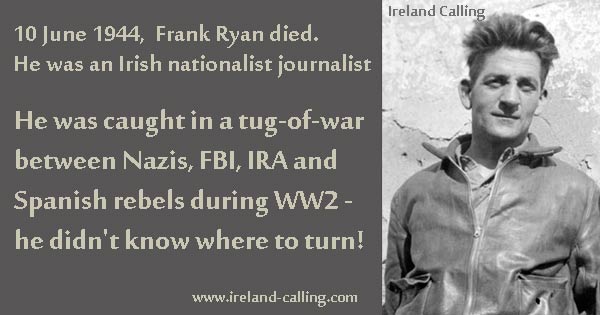Frank Ryan was an Irish nationalist journalist who supported the pro-Treaty faction of the IRA in the 1920s. In 1933, he co-founded the Republican Congress, a separate body to the IRA that would gather support for a mass revolution amongst Irish working classes.
However, Ryan became distracted by the Spanish revolution and an Irish brigade being gathered to go and fight for General Franco. Ryan opposed this and actively tried to dissuade people from supporting the fascist cause. This was a dangerous move as the general feeling amongst the public was that of sympathy to Franco.
 In fact, at one rally by Ryan he had to climb a lamp post to escape the angry mob as he tried to gain support for the Spanish rebels. However, he did gain some Irish followers and in 1936 he led a troop of 80 men to fight against Franco alongside the Spanish.
In fact, at one rally by Ryan he had to climb a lamp post to escape the angry mob as he tried to gain support for the Spanish rebels. However, he did gain some Irish followers and in 1936 he led a troop of 80 men to fight against Franco alongside the Spanish.
He was captured by an Italian brigade loyal to Franco in 1938. He was imprisoned and given a death sentence, which was later reduced to 30 years labour. However, Ryan was released after the Irish government hired a lawyer who had connections in the German secret service. Ryan’s release from the Italian jail did not mean that he had become a free man.
The Germans believed Ryan had influence in Ireland both with the IRA and the government. They were keen to keep Ireland neutral in the war and believed Ryan could be used to ensure that happened. They also knew he had the contacts to gain information from the main organisations in Ireland if need be. The IRA saw Ryan’s new position to mean he was now their representative in Germany. Ryan wanted Ireland to remain neutral in the war, but was concerned that it lacked the weaponry to defend itself if the need arose, and so he tried to arrange arms to be delivered to his homeland.
During this time, Ryan was also arrested by the FBI who had intercepted a letter he had sent to America. They were actually looking for IRA leader Sean Russell, unaware that had died a few years earlier. The FBI released Ryan, accepting that he would not work for the fascist government.
He had now been outside of Ireland for six years, and wanted nothing more than to return safely. However, he had become too intertwined in the political jostling between the world’s major powers, and was not safe anywhere. He remained in Germany until his death in 1944.
history.html
Frank Ryan – Irish revolutionary who fought Franco
